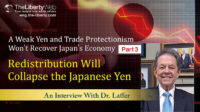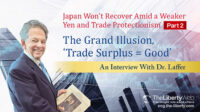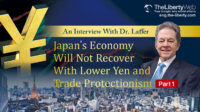In China, a War Between Politics and Economics Will Soon Begin
Recently, anti-Japanese riots have flared up throughout China, and behind these demonstrations, we should note that a part of the cause lies in the widening gap between haves and have-nots. As the economy is slowing faster than many had expected, there is growing concern regarding job security, the availability of reliable and affordable health care, social safety nets, etc. Instead of taking blame for the consequences of these political outcomes, the Communist Party has channeled its people’s frustrations into anti-Japanese demonstrations.
But what, in the first place, would be needed to keep the economy robust in China? Could it be possible without making political reforms? Regarding these economic and political issues, in 2010 Master Ryuho Okawa foresaw a battle that could soon begin in China.
What follows is an extract of the lecture titled The Decision to Bring Peace given on Dec 19, 2010.
Now, let’s move on to consider China, which I believe has an extremely important and difficult decade ahead. There have already been many predictions of crises in China, but I sincerely hope for the sake of the Chinese citizens that the country changes in the next ten years, and moves in a course that will bring happiness to its citizens.
The current direction that China is headed in, that of extending their hegemony by military means, throughout Asia and to Africa, is one which is sure to give rise to a large-scale world war. Because I believe that things are certainly going that way, I would like to see China reaching the end of its tether at a certain point. I’d like to see the forces of democracy and freedom emerging from within the nation itself. On a political level, I would like to see them becoming a regime capable of flexibly talking with Western powers, a nation capable of listening to the opinions of others.
Of course, the power of ideology will play a huge role in this sense. China is a country with 1.3 billion people, and it constitues a fifth of the entire world’s population. Those men, women, and children have never been told the name, neither shown the face, of their Nobel Peace Prize recipient. Theirs is a system which can restrict the dissemination of information. The very fact that such a thing is possible in this current age seems extremely unusual. They have isolated themselves at an informational level. Their thinking is that the people, who are being governed, do not need to be informed of what is going on; that it is enough if they listen to the opinions of their central party members. I think this is essentially a battle between politics and the economy. With us, too, there are of course cases where it is predicted that the political principles will take a precedent, but in the end, it is the economic side that will win out. That is how I see it.
If we were to ask what the most important economic principles is, it would basically boil down to a simple idea that no prosperity can exist without the protection of freedom. If freedom is not safeguarded in the economic world, or fundamentally kept safe in the world of commerce and commercial acts – if people are unable to act freely, then there is no development and no prosperity.
Hence, although there may be a certain level of development within a controlled economy, and a planned economy may seem to be going somewhere, a certain point exists at which it will be doomed to fail. It is impossible for the central government to regulate entirely every last area of the total economy. A planned economy is possible at an early stage with very low-levels of resources. From the very modest periods up to the level of heavy industrial production, this planned economy is possible, but a controlled economy cannot be a guiding principle for a country after a country reaches a stage where it truly pursues development that actually ‘originates from freedom’.
At this stage, the combined strengths of the individual entrepreneurs and managers become the economic power of the nation.
That is what is about to happen in China, I believe. This might not be a good thing as far as the Chinese politicians are concerned. The Third World War between America and Russia, which wasn’t an actual war, but a virtual war, a cold war, has ended, and I just pray that there will not be another ‘virtual’ world war, the World’s Fourth War, waged between China and America. I believe that if the current Chinese system were to allow its people to access information freely, then the entire system would collapse. In addition, if it were to make information available publicly, and if it were to allow people to express their opinions freely, then the country would form a democracy. In fact, this is what I hope will happen in China.
There is something strange going on when multiple opinions are not supported in a country of that size. For all of those opinions to be weeded out as non-conformist acts, like criminal deeds, is an abnormal state of affairs. I think that there is also a need, in all of this, for China to review its relationship with Japan.
I believe that the Chinese perception of Chinese-Japanese relations will slowly change on an individual basis, with a good number of Chinese tourists visiting Japan, but a fundamental change is ultimately needed at a political level as well. I hope that in this decade, with a continued struggle toward democracy, China will be reborn as a new nation.
Related
- Hong Kong People must Become the Leaders of China:
On his visit to Hong Kong on the 22nd of May 2011, Master Ryuho Okawa strongly stated, “You are one portion of great China, but you are the teachers of great China, and you can teach all of the Chinese people. You are the leaders of the people of China.”…
- “Liberty” is Another Name for El Cantare:
The ultimate objective of a nation is to give its people liberty and to lead them to prosperity and happiness. This is the final goal of a nation, and its raison d’être. The problem is that the concept of a nation and its raison d’être are wrongly understood. Simply preserving the existence of a nation is not God’s goal,…
- “Using a Nuclear Threat to Get Rid of the U.S., and to Take Over Japan” Xi Jinping’s Guardian Spirit Confesses His Bloodcurdling Ambitions
While Xi Jinping, soon expected to be the general secretary of the Chinese Communist Party, disappeared for two weeks, the anti-Japanese demos have been spiraling out of control in China, and large scale terrorist attacks targeting the U.S. have broken out the Middle East….



















